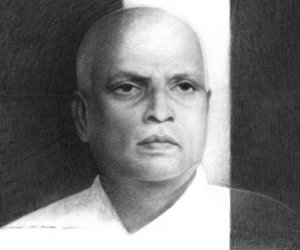 Shri Atmananda
Shri Atmananda
The same word, used in similar contexts, cannot carry different meanings with different persons. When I say ‘I’ meaning ‘my body’, another understands it in the same sense, meaning ‘my body’. But when the other person uses the same word ‘I’, he means ‘his body’, which is entirely different from ‘my body’.
Thus, in the case of everyone, the bodies meant are different; but the word used is the same ‘I’, always. So the ‘I’ must mean: either the individual bodies of all men – which is ludicrous – or it must evidently mean no body at all. The latter being the only possible alternative, the ‘I’ must necessarily mean that changeless principle in which every body appears and disappears. This is the real meaning of ‘I’, even in our daily traffic with the world.
What appears as world?
As soon as we wake up from deep sleep, the existence of a ready-made world – including our own bodies – confronts us. To examine it closely, we utilize our sense organs straightaway – one by one, relying on their superficial evidence without a thought.
The organ of sight asserts that the world is only form and nothing else; the organ of hearing that the world is only sound and nothing else; and so on. Each organ thus asserts the world as its sole and particular object. In effect, each sense organ contradicts the evidence of the other four organs, with equal force. This hopeless mess of contradictory evidence, and the stubborn denial by each of the sense organs of the others’ evidence, form positive proof of the falsity of this world – as it appears.
But all the while, the existence of a positive something is experienced without a break, beyond the shadow of a doubt. This, on closer analysis, is found to be that changeless, subjective ‘I’-principle or Consciousness itself.
Deep sleep
The knowledge of one object implies the ignorance of all objects other than that particular object. The ignorance of all objects in deep sleep means really the positive knowledge of the self, which shines as happiness there. Consequently, the ignorance of the ordinary man in deep sleep is really the knowledge of his own self, which is happiness and Consciousness.
The so called ignorance of the world in deep sleep is nothing but the knowledge of the self, which is happiness itself. Thus the experience in deep sleep, if properly understood, is only one; and that is our own self, which is Happiness and Peace. There is only one there; and hence the ignorance of the many is no experience at all.
Peace of mind
The most universal of all desires in man is unequivocally expressed in the spontaneous statement made by all alike: ‘I want peace of mind’. It means that the activity of the mind is never our ultimate goal. Examining this statement closely and impartially, we find that Peace is the real goal of man’s desire. But in his utter inability to extricate himself from the clutches of the mind, he links the mind also to that desire for absolute Peace, and claims himself to be the enjoyer. But alas, when the mind, freed from all its activities, comes into contact with the Peace it desired, it finds itself merged and lost in that peace, thus returning to its real nature. Therefore, it is one’s own real nature that everybody seeks, knowingly or unknowingly.
Excerpted from ‘Notes on Spiritual Discourses of Shri Atmananda’ taken by Nitya Tripta. The 135th birth anniversary of Shri Atmananda will be observed on December 8






